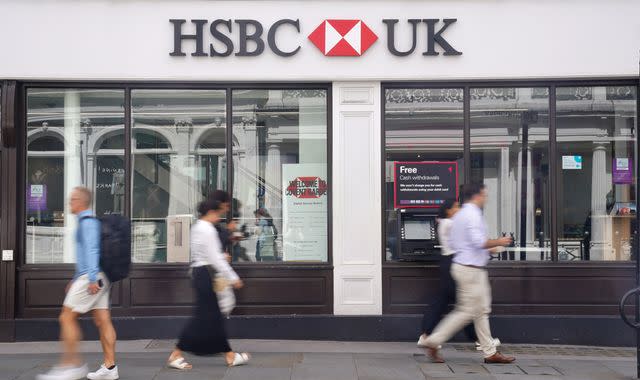HSBC hit with £57m fine over deposit protection

HSBC has been fined more than £57m for failing to protect consumer deposits.
The fine, totalling £57,417,500, has been levied by the the Bank of England's Prudential Regulation Authority (PRA) for failing to protect consumer deposits from 2015 to 2022.
Money latest: 'Huge change' to UK's food supply from tomorrow - and prices could rise
It's the second highest fine ever applied by the regulator, reflecting the seriousness of the breaches, it said.
Under post-financial crash rules, deposits of up to £85,000 are safe in the event of a bank's collapse under the Financial Services Compensation Scheme (FSCS).
But the lender incorrectly marked 99% of eligible deposits as "ineligible" for FSCS protection, the watchdog said.
The depositor protection failings were found to be so significant the PRA said it had "materially undermined" HSBC's readiness for a restructuring.
Read more from Sky News:
Lloyds axes mobile bank branches as lender shifts services online
Deposit protection rules require banks and building societies to put systems in place to create accurate information for the FSCS to rely on if a financial institution fails.
A fine of £96m was avoided by cooperation throughout the investigation and admitting early that certain rules were breached. Such behaviour cut the fine by 15% while agreement to resolve the issue qualified for a further 30% reduction.
Had such a fine been imposed it would have surpassed the record £87m that Credit Suisse was hit by last summer.
One of the failings stemmed from the absence of a senior manager with responsibility for the processes and information required under depositor protection rules.
HSBC also attracted criticism for failing to be "duly open and cooperative" by not alerting the PRA about problems identified in the incorrect marking of accounts as "eligible" for FSCS protection over a 15-month period.
"This was clearly information which the PRA would expect firms to share fully and in a timely way," the regulator said.
The bank "fell far short of its obligations in this area, and failed to disclose its failings to us in a timely manner", said Sam Woods, a Bank of England deputy governor.
The PRA said, however, the breaches were not deliberate or reckless.

 Yahoo News
Yahoo News 
